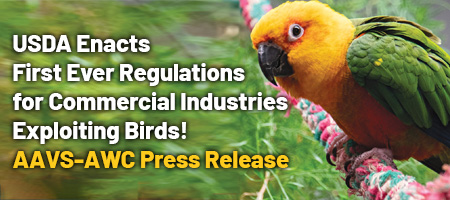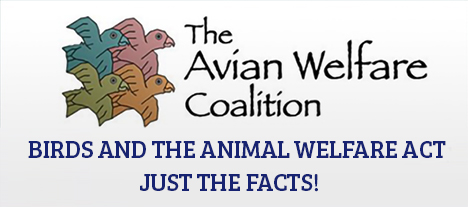Avian Welfare Laws & Legislation
After a 23-year legal effort by animal protection groups and a successful lawsuit brought by AWC and the American Anti-Vivisection Society, there are now official legal protections for birds exploited in the pet trade, exhibition, breeding and some types of research. For the first time, these birds are now afforded species-specific welfare standards under the Animal Welfare Act.
Despite the numerous shortfalls of the final regulations, this victory is worth celebrating. It will bring 5,000 commercial entities under regulation and subject to inspection by USDA. It also includes requirements for the transport of unweaned birds, wading areas for aquatic birds and psychological enrichment for all covered birds.
The bad news is this regulation won’t cover pet stores, still permits wing pinioning of birds, and does not require that birds be provided with sufficient space to fly. It also provides an enormously generous exemption that allows substantial and lucrative breeding operations to evade regulation. As it stands, breeders who sell less than 200 birds (weighing 250 grams or less)) annually are exempt for licensing – a provision that essentially amounts to 'protection by the pound.' No other covered animal's welfare is measured in terms of their weight.
Our job is far from done.
Birds are frequently excluded from animal welfare legislation, pet shop regulations, and existing animal cruelty statutes. This must change!
Since 2000, AWC has been at the forefront to increasing legal protections for captive birds exploited by the pet trade and to support legitimate conservation programs aimed at preserving birds' rightful place in the wild. We also support legislation to benefit native bird populations and their habitats, to protect naturalized parrots in the U.S., and to create safer journey for migratory birds.

As a result of a lawsuit brought by the American Anti-Vivisection Society (AAVS) and the Avian Welfare Coalition (AWC), there are now official legal protections for birds exploited in the pet trade, exhibition, breeding and some types of research. For the first time, these birds are now afforded species-specific welfare standards under the Animal Welfare Act (AWA).
"There Ought To Be a Law" webinar.
Learn more about the current laws governing captive birds at the resources below:
Avian and Animal Protection Resources
USDA Standards for Birds under the Animal Welfare Act
USDA Animal Welfare Care Inspection Procedures for Birds
USDA Animal Welfare Complaint Form
The Hidden Face of Bird Abuse [pdf]
By Denise Kelly, National Animal Control Association Spring 2020 Issue
Guidelines for Evaluating Bird Abuse & Neglect – A quick guide to aid humane enforcement in evaluating conditions that may contribute to the mistreatment of captive exotic birds and to help facilitate corrective actions. Note: Items covered in this checklist do not necessarily reflect legal requirements. Pet shop and anti-cruelty laws vary between states. Check your state's pet shop laws.
Color-Coded Map of Laws Relating to Birds in Pet Shops [pdf]
Animal Legal Defense Fund
Animal Law Resource Center


